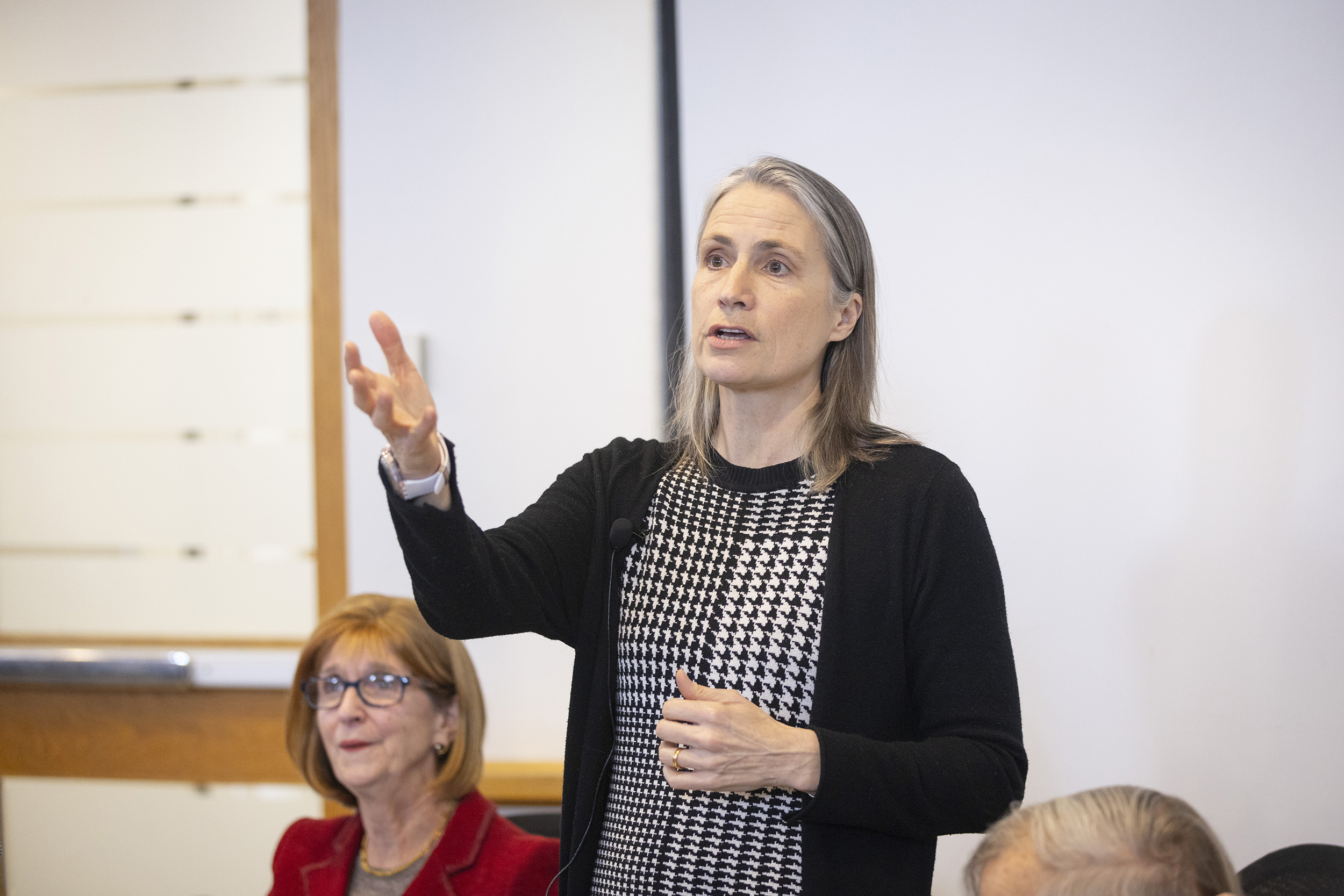‘Russia will always matter’

“Because of its strategic location, the size of its land mass, its environmental impact, we’re not going to be able to avoid dealing with Russia,” said former White House Russia expert Fiona Hill (center).
Niles Singer/Harvard Staff Photographer
Fiona Hill warns U.S. against losing focus on Ukraine, Putin amid Israel-Hamas war
As the two-year-old war in Ukraine continues with no end in sight, Russian President Vladimir Putin is feeling the heat with his country’s economy under strain and an estimated hundreds of thousands of Russian soldiers dead or injured.
“The war has damaged Putin,” said former White House Russia expert Fiona Hill. “The more this drags on, the less beneficial it is for Putin.”
The senior fellow at the Brookings Institute Center on the United States and Europe Hill offered her assessments on the war’s prospects, Putin’s political future, and Russia’s geopolitical importance during a talk Tuesday afternoon, sponsored by the Belfer Center and Russia Matters at Harvard Kennedy School.
Putin remains committed to winning the war, launched in February 2022, because it could bolster his chances to stay in power, she said. Putin, who became Russia’s president in 2000, passed a law in 2021 that would allow him to remain in power until 2036.
“The end game for Putin is Ukraine’s capitulation,” said Hill.
Hill, A.M. ’91, Ph.D. ’98, served as national intelligence officer for Russia and Eurasia at the U.S. National Intelligence Council under Presidents George W. Bush and Barack Obama and was senior director for European and Russian affairs on the U.S. National Security Council under Donald Trump. She emerged as a public figure after testifying before Congress in 2019 on Russian interference in the 2016 election during the first impeachment inquiry against Trump.
Hill noted that the Israel-Hamas war had shifted some of the world’s attention from Ukraine, a development that might not bode well for Ukraine and its president, Volodymyr Zelensky. She stressed the need for the U.S. government to remain vigilant.
“Russia will always matter,” said Hill. “It’s not just about the battlefields or the way we think about nuclear weapons. It’s the inescapable fact that we have this large country, the largest country on Earth in terms of land mass … Because of its strategic location, the size of its land mass, its environmental impact, we’re not going to be able to avoid dealing with Russia.”
For example, Russia, which has the world’s largest forest area, must be included in any conversation about climate change, said Hill. “Russia has to be part of the solution, not just part of the problem,” she said.
Hill, who said her fascination with Russian history and literature began while she was growing up in England, lamented the ways in which U.S. administrations have not been able to maintain a consistent policy toward Russia.
“Every new administration that comes in rediscovers Russia,” said Hill. “We haven’t been consistent in trying to think about the way that Russia acts, or the way Putin acts … The one thing I would say about Putin and Russia is this: Never write either of these off because Russia always matters and right now, while he is still with us, Putin matters as well.”
Another aspect to consider is Russia’s relationship with China, said Hill. China’s president, Xi Jinping, visited Russia in February 2023 in a show of the solid ties between the two nations. China has become Russia’s most important trading partner in the aftermath of Western sanctions imposed against Russia.
U.S. policies toward both Russia and China have played a role in pushing them together, Hill said, along with their shared economic interests.
“It is also a strategic imperative for China and Russia to pull closer together,” said Hill. “There are also the results of the personal relationship between Xi and Putin, who think about the world in similar ways.”
This seminar was moderated by Graham Allison, Douglas Dillon Professor of Government, and Ambassador Paula Dobriansky, Belfer Center Senior Fellow and former Under Secretary of State for Global Affairs.




